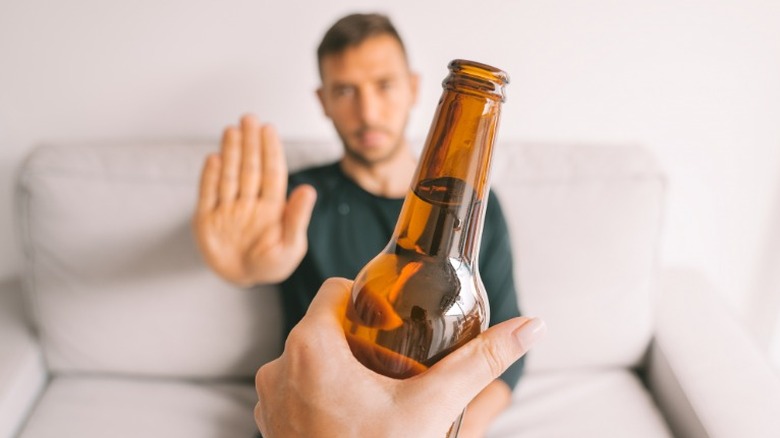Is Nonalcoholic Beer Safe To Drink For Alcoholics?
If you like to crack open a cold one, then you know just how refreshing an ice-cold beer can taste. And of course, it can feel relaxing to have a beer. But you might not know that drinking beer in moderation may actually have some health benefits (via Medical News Today). For example, beer contains a diversity of nutrients that range from minerals, like calcium, iron, and zinc to vitamins, like B1, vitamin D, and folate. Beer even contains amino acids such as aspartic acid, glycine, and proline. In addition, low to moderate beer consumption has also been linked to lowering the risk of heart disease, neurodegenerative disease, and osteoporosis. Plus, lastly, it may help regulate blood sugar levels, which could reduce the risk of developing Type 2 diabetes.
However, beer does contain an addictive substance known as alcohol. And the overuse of alcohol can lead to a number of negative health consequences and addiction.
What is alcohol use disorder?
Excessive alcohol use can lead to a number of health conditions, like cancer, heart disease, high blood pressure, liver disease, a weakened immune system, and even alcohol use disorder, according to the Centers for Disease Control and Prevention (CDC). Someone unable to control their urge to drink, constantly thinking about alcohol, and consistently consuming it despite causing health or life issues may have alcohol use disorder (per Mayo Clinic). Another sign is the need to drink heavily and drink more in order to get the same level of inebriation or drunk. When a person with alcohol use disorder takes a break or tries to stop drinking, they may experience withdrawal symptoms, such as anxiety, irritability, sweating, nausea, and vomiting.
Other symptoms of alcohol use disorder include spending less time with friends, family, or work in order to drink, wanting to quit drinking but failing to do so, and binge drinking, which is where someone consumes more than four alcoholic beverages in a short period of time. Luckily, there are treatments for alcohol use disorder. For many, treatment involves asking for support, getting sober, and then detoxing. With that said, you might wonder if nonalcoholic beer can be part of a healthy treatment plan.
Why alcoholics should avoid nonalcoholic beer
Nonalcoholic beer is a total misnomer because it actually contains alcohol — up to 0.5% alcohol by volume (per Resurgence Behavioral Health). In fact, a 1999 study published in the Journal of Clinical Forensic Medicine discovered that nonalcoholic beer consumption in a patient with end-stage liver disease obtained a blood alcohol level of 57 milligrams per deciliter, which equates to around 0.057% blood ethanol level. That's a significant blood ethanol level achieved from the alleged nonalcoholic beer. To make things more dangerous, as many as 30% of nonalcoholic labeled beers may contain more than the labeled 0.5% alcohol by volume content and can range up to 1.8% alcohol by volume.
So, it is entirely possible to overdrink or binge drink nonalcoholic beers and get a slight feeling of euphoria or buzz. Further, drinking nonalcoholic beer can reinforce the old habit of beer drinking, which can lead to temptation or even cravings. Therefore, if you are considering a nonalcoholic beer, you may want to try grabbing a soda or other carbonated beverage instead.



